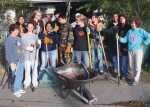City code enforcement officer works to clean up the town

After just over a year on the job, the city's code enforcement officer, Janice Kelly, has worked hard to bring city residents into compliance with existing city codes.
No matter who they are. She's sent warnings to the mayor, members of the city council and the county commissioners, police officers, the newspaper editor, and even her own boss, Building Inspector Mike McCain.
So far, she hasn't had to issue a citation, however.
"A lot of people may be in violation of a code, and not know it. So a lot of what I do is educating citizens."
Generally, she said, "people seem surprised when they get one of my letters, but I'd say 75 percent get things fixed up within the 10-day time frame" that the code calls for. "Some call me back and ask for a time extension, which is fine."
Because Kelly isn't into citing people. She just wants to "clean up the town" and make sure everyone meets the code.
If they have difficulty doing it, she works with them.
Recently, for example, she sent a letter to an elderly woman concerning trash in the lady's back yard. The woman simply wasn't physically able to do the work, so Kelly went searching and found some volunteer staff and students at McKenna Charter High School to do the work.
Nor was that the first time she'd done something like that. When someone is too old or physically disabled and can afford to hire the work done, she's found volunteers from individual citizens to the Idaho National Guard to help bring those people into compliance with the city codes.
"If somebody is just lazy," and not meeting the 10-day request to come into compliance with the codes, "I'll stick on them pretty good. But most of the time, they have a good reason. I'm willing to work with people" who make good-faith efforts. "I understand people who work paycheck to paycheck and don't have a lot of extra time or money. I'm willing to work things out with them."
And, she said, "some people have multiple violations and overwhelmed about where to start."
Most people comply quickly with her requests, but "some get in my face. I get a lot of abuse. In their eyes, they're not a criminal, and they think they can do anything they want with their property. Of course, they're wrong. There are limits.
"Some people think I'm picking on them, but really it's everybody. I cannot show favoritism." And the fact that she's fairly new to Mountain Home helps, because she really doesn't know who is supposed to be important and who isn't.
Her job, and a similar position created by the county, arose out of a community survey conducted several years ago. "People wanted someone to clean up the city," she said. But until her position was created, no one was specifically responsible to seeing that city codes were met, and enforcement was hit or miss, based mainly on complaints.
Kelly checks out all complaints that come into her office, but she also drives the streets, looking for violations.
The most common complaints involve junk in yards ("some people just can't throw anything away"), parking and storing of unlicensed vehicles, excessive weeds that pose a fire hazard, blocking public sidewalks ("that can really cause a problem for people with wheelchairs"), or trees or bushes that interfere with people using the roads or sidewalks and need to be trimmed back.
In addition, she looks for "public nuisances," such as abandoned refrigerators that pose a danger to children, and responds to complaints about offensive smells, usually from dog kennels, "but once I even had an elk carcass lying in someone's front yard."
Although her work primarily is focused on keeping the town looking good, she said there are secondary benefits as well.
If a child lives in a home that looks like a dump, there may be health issues involved, but at the least, it tends to affect their self esteem. Thye feel better about themselves, have a little more pride, when the place they live in has been cleaned up, she said.
In fact, she hopes to get more young people involved in helping keep the city looking good. She plans on creating a Youth Code Enforcement Program in the schools. "It's like an education process. If we get children conscious about the need to, say, cut weeds, and respect their neighbors, it will help everyone. I'll be teaching common courtesy and what it means to be a good neighbor -- that it's cool to help a neighbor if they're elderly."
In the end, Kelly said, her whole job is about "giving the city a facelift," and making sure that everyone, no matter who they are, follows the codes.
